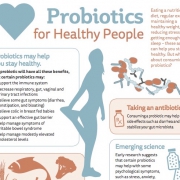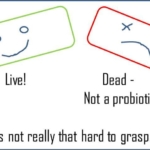Probiotics for oral health: start young
By Dr. Mary Ellen Sanders
Prof. Wim Teughels from the Department of Oral Health Sciences, Leuven University, spoke at the 2018 ISAPP meeting on the topic of probiotics and prebiotics for oral health. He embraced the opportunity to speak to this audience in part hoping he could convince researchers to consider incorporating oral health endpoints in their future clinical trials.
He did a spot-on lecture, which precisely summarized available evidence for probiotics and prevention of dental caries, management of periodontal disease and reduction of Streptococcus mutans in the oral cavity. This area of research is gaining traction (see here).
One study he discussed is particularly interesting by Stensson et al. 2014 tracked caries in children at 9 years of age. This single-blinded, placebo-controlled study administered L. reuteri ATCC 55730 to mothers during the last month before their baby’s birth and to the children through age one. The number of children receiving the L. reuteri probiotic without caries was significant higher (82%) than in the placebo group (58%). Although there are studies available that show a larger impact, the interesting aspect of this study is that it tests a very early intervention in life that seems to have an effect up to 9 years later. It is an important paper because it opens up the notion of early interventions in life, during microbial ecology development. The main message here is you don’t need to wait until there are teeth to start working on dental health later in life. In fact, interventions for dental health can start during pregnancy and by this:
- The pregnant mother will have less pregnancy gingivitis (Schlagenhauf et al. 2016)
- The delivered child will be less susceptible to tooth decay and gingival inflammation (Stensson et al. 2014)
We do not know what would have happened if the probiotics were given during the whole 9 years of life. Dentists who are interested in prevention should be interested in such data.
Several meta-analyses have summarized data for dental caries and management of periodontal disease. These reviews are useful in that they summarize the totality of evidence. But combining data on different strains might not be justified, as different strains may utilize different mechanisms to achieve effects, and therefore should not be considered as the same intervention. See here, here, here and here.
In sum, there appears to be a growing body of evidence that probiotic administration may impact several indicators of oral health: dental caries, gingivitis and periodontitis. More research is needed to understand the impact of probiotic supplementation on the oral microbiota and if clinical benefits are mediated by microbiota changes. It’s also important to understand which strains will deliver the strongest benefits, although L. reuteri has several, positive studies, and the importance of dose and temporal factors with dosing.















